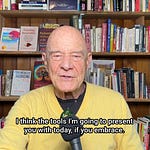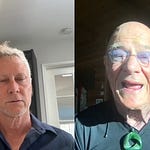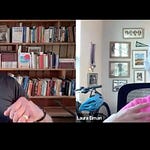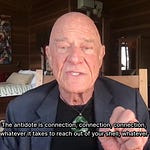Dear Listener,
This week I am privileged to introduce you to Jules Evans – author of books including Philosophy for Life and The Art of Losing Control. He is also the director of the Challenging Psychedelic Experiences Project and the editor of the Ecstatic Integration newsletter, which I recommend subscribing to below.
While psychedelics offer incredible potential for healing when used responsibly, we must also understand the risks involved and how to navigate challenges should they arise.
As Jules puts it, "We are still learning what helps people to put themselves back together after these challenging trips."
As psychedelic medicines become more accessible, demand for guidance is skyrocketing. Yet the stakes are high without proper safety precautions and professional support. Jules and his colleagues have documented a wide range of potential unwanted complications, from anxiety and social disconnection to existential confusion and even feelings of demonic possession.
Some key findings from their research:
39% of people who had a challenging psychedelic trip said it was one of the 5 most difficult experiences of their lives
In one survey, a fifth of people reported difficulties lasting over a year after a bad trip, and another fifth had issues persisting over 3 years
The most common adverse effects were increased anxiety, social withdrawal, and ontological shock that profoundly unsettled people's worldviews
A small number of people felt they had picked up negative entities requiring exorcism
Some individuals suddenly "remembered" childhood abuse that may or may not have actually happened
Weeks or months of derealization are not uncommon, where people question what's real
"People can have things happen to them during psychedelics and after psychedelics which are unexpected and unwanted." - Jules Evans
Jules himself struggled with PTSD for years after a bad LSD trip at 18. A later, accidental near-death experience finally freed him from identifying with the belief that he was permanently damaged.
While adverse effects are in the minority, they are likely under-reported, sometimes even in clinical trials. Anecdotes abound of boundary violations from "shamans" exploiting their power, charging exorbitant fees, or even sexually assaulting clients.

As a long-time veteran of the psychedelic world, I've had countless positive experiences that dramatically improved my quality of life, creativity and connection to others. Yet I've also witnessed irresponsible use and the wreckage that can result without proper precautions.
The promise of psychedelic healing demands that we move forward with wisdom, integrity and care - not with blind enthusiasm or profit incentives alone. Confronting our shadow material is no small task. These medicines work, often by plunging us into the depths of the human psyche. Having a skilled, compassionate guide is worth its weight in gold. With solid ethical practices, psychedelic sciences can truly blossom into powerful modalities for the betterment of all.
Join Jules and me this week for an eyes-wide-open look at the complex realities of working with psychedelic medicines.
Golden light,
Dr. Richard L Miller
Listen to Learn:
What led Jules Evans to become interested in studying the harms of psychedelics and the importance of discussing risks and benefits?
How can challenging psychedelic experiences trigger profound anxiety and fear, leading to extended difficulties or post-psychedelic trauma?
What are the common types of difficulties reported after challenging trips, such as anxiety, fear of permanent damage, and social disconnection?
How do individuals cope with existential confusion and navigate intense mystical experiences that challenge their beliefs and understanding of the world?
What are the potential risks and adverse effects of psychedelic medicine, and how can they be mitigated through proper guidance and support?
How does the lack of psychedelic literacy and access to trained guides contribute to negative experiences and prolonged difficulties?
What research is being conducted on the long-term impacts of challenging trips and strategies for supporting individuals who have experienced harm?
Why is it crucial to have open discussions about both the positive and negative effects of psychedelics to ensure comprehensive and responsible use?
Links and Resources
My Books
Freeing Sexuality: Psychologists, Consent Teachers, Polyamory Experts, and Sex Workers Speak Out
Psychedelic Wisdom: The Astonishing Rewards of Mind-Altering Substances
Psychedelic Medicine: The Healing Powers of LSD, MDMA, Psilocybin, and Ayahuasca
Integral Psychedelic Therapy (co-edited with Jason A. Butler & Genesee Herzberg)












